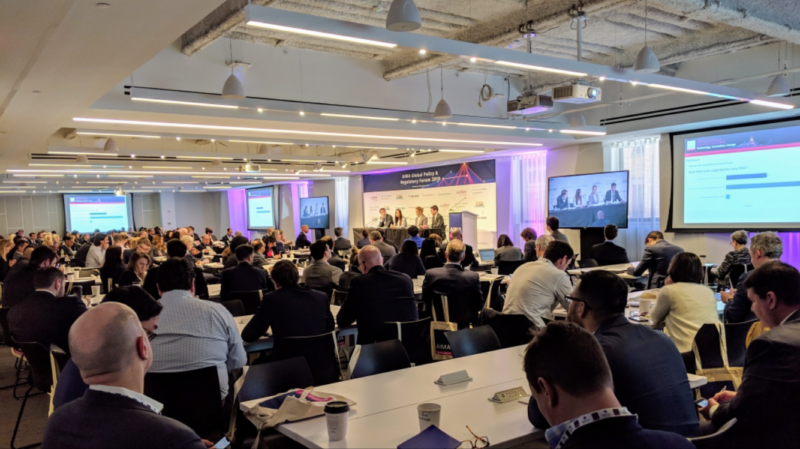A Recap of AIMA’s 2019 Global Policy & Regulatory Forum
Published: 15 April 2019
by Kara Bingham, Hedge Fund Law Report
On March 26, 2019, the Alternative Investment Management Association (AIMA) held its annual “Global Policy & Regulatory Forum” (GPRF) in New York City. This year’s event was devoted to the themes of technology, innovation and change, although the lingering question of whether Britain would leave the E.U. with or without a deal – or leave at all, for that matter – periodically arose throughout the day. Despite this uncertainty, the overall mood was positive, as speakers noted that their Brexit contingency plans accounted for the array of possible outcomes.
The GPRF included insights from regulators across several different jurisdictions, and it prominently featured conversations with Commissioner Rostin Behnam of the U.S. Commodity Futures Trading Commission and Commissioner Hester Peirce of the U.S. Securities and Exchange Commission. As in prior years, the event was held under the Chatham House Rule; therefore, particular comments or opinions cannot be attributed to specific speakers. Some of the core themes, however, explored during the program include the following.

ESG: Transforming the Investment Process
The push toward responsible investing continues to be a disruptor in the asset management industry. In response to a polling question during this panel, 25 percent of respondents indicated that they already integrate environmental, social and governance (ESG) considerations into their investment process, while nearly three-quarters of those polled were interested in learning more about ESG investing. This movement is being driven, at least in part, by allocators as they continue to seek ways to express their ESG values through their investment portfolios. One key observation from the panel included the fact that many of the largest allocators are strategically hiring senior-level professionals to lead their responsible investing efforts.
Europe continues to lead the way on responsible investing. The European Commission adopted an action plan in March 2018 with respect to financing sustainable growth and has since taken several steps to implement that action plan, including issuing proposals on the: (1) establishment of a unified classification system on what can be considered an environmentally sustainable economic activity; (2) provision of disclosures to end investors by asset managers on how they integrate ESG factors into their risk assessment processes; and (3) adoption of a new category of benchmarks comprising low-carbon and positive-carbon impact benchmarks, which will provide investors with better information on the carbon footprints of their investments.
According to the panelists, some small to mid-sized investment managers are concerned that the trend toward ESG investing will create an additional obstacle to their growth. For investment managers that want to explore ESG integration but are unsure of where to start, the panelists offered some guidance. To begin with, a fund manager should assess which ESG factors its investment portfolios have exposure to, as well as the materiality of those factors to its portfolios. Next, a manager should seek to evaluate how the integration of those material ESG factors would impact its portfolios from a performance perspective. Finally, if a manager elects to commit to the integration of ESG factors into its investment process, it is critical that the manager tailor its approach to each of its funds.
Outsourcing and Changing Business Models
As the costs of running an asset management business continue to rise while fees continue to compress, fund managers must increasingly rely upon outsourcing arrangements in order to deliver investment services to their clients and meet their regulatory obligations. Regulators appear to understand that outsourcing can offer certain benefits to fund managers and their clients, but this practice also raises certain risks, which must be managed. Additionally, one panelist noted that a regulated entity should carry out as much of a regulated activity as possible, and outsourcing should only be permitted when it is prudent and there are legitimate reasons for doing so.
Fund managers must be mindful of the fact that even when they outsource certain functions, they retain liability for those functions. Therefore, it is critical that they conduct initial and ongoing due diligence on those service providers. It should also be noted that for purposes of the panel, the term “outsourcing” was broadly used and included the delegation of portfolio management as well as other functions. With that as the backdrop, the conversation largely focused on how fund managers can manage the risks associated with outsourcing.
The panelists noted that having an outsourcing policy is a basic requirement. Generally speaking, these policies and procedures should govern all outsourcing arrangements and should not – at least from a due diligence perspective – distinguish between when the manager outsources to affiliates versus non-affiliates. Once a regulated entity is outsourcing any activity to a service provider, regulators expect the fund manager to conduct appropriate due diligence of the service provider. One panelist noted that fund managers should resist the urge to categorize some outsourced services as more important than others. In other words, fund managers should perform thorough due diligence on all third parties that they engage. Regulators also expect fund managers to conduct regular on-site inspections of service providers, even when a service provider itself is regulated. Finally, a panelist noted that regulators are becoming more active in conducting on-site reviews of service providers, even when located in other jurisdictions. On-site reviews are all the more likely when the regulator believes that its registrants are heavily relying upon a specific service provider.
Enforcement Priorities in 2019 and Beyond
Five regulators from across jurisdictions and agencies came together to offer their views on enforcement priorities in 2019. Two topics emerged as clear priorities: cybersecurity and digital assets.
With respect to cybersecurity, some regulators are taking a more prescriptive approach by adopting specific cyber-related regulations, while other regulators prefer to allow regulated entities to develop their own tailored policies and procedures. This conversation followed the announcement a week earlier by the SEC’s Office of Compliance Inspections and Examinations that it would conduct its third cybersecurity sweep exam, with a particular focus on the practices of SEC-registered investment advisers with multiple offices and those involved in recent mergers and acquisitions.
Regarding digital assets, while early enforcement actions focused on the use of cryptocurrencies to engage in illicit transactions, regulators are now poised to expand the scope of these cases to focus on the use of cryptocurrencies in financial crimes, including fraud and market manipulation.
For some time now, regulators have been devoting significant resources to analyzing the reams of data that they are authorized to collect. They are now benefiting from those efforts and are using technology to guide them on how to spend their limited resources, including which registrants to examine. After initiating an examination, regulators are also using technology to efficiently and effectively review the data they receive during those exams.
Regulators continue to evaluate an adviser’s overall “culture of compliance” as part of their risk assessments. One regulator noted that a firm’s culture will not only influence how often it examines a specific adviser, but it also affects how the regulator views compliance breaches by the adviser. In terms of evaluating a firm’s culture, a few panelists noted that they begin by reviewing the adviser’s policies and procedures. From there, they seek to understand how those rules work in practice and whether the employees have in fact absorbed those rules.
Technology As a Gamechanger
The speakers on this panel readily agreed that fund managers should be using technology to streamline their enterprises. For fund managers that are less savvy when it comes to technology, the panelists offered some advice on how they can begin to embrace technology. First, fund managers should begin by identifying which processes they are still performing on a manual basis and consider whether there is a technological solution available to digitize those processes. Thereafter, the fund manager must decide whether it is better to “buy or build” the solution. While large asset managers often have the resources to build bespoke solutions to address their needs, the panelists noted that fund managers should leverage their relationships with their existing service providers, as they often offer reasonably priced technological solutions and already have access to a lot of the fund manager’s data. Finally, the panelists noted that the path to automation and digitization is iterative. It should be seen as an evolution, not a revolution.
The focus of this panel then turned to data, as panelists generally agreed that regulators are unlikely to scale back data requests in the future. Panelists expressed the desire for more dialogue between fund managers and regulators on this topic. According to members of the panel, critical discussion points could include:
- the inherent tension between a fund manager’s desire to not disclose its data versus the regulator’s need to collect data;
- consistency of definitions across different reporting regimes;
- what assurances regulators can provide with respect to the protection of a manager’s data;
- whether regulators are requesting correct data sets to meet their goals;
- how regulators could better facilitate the production of data by fund managers; and
- the length of time that regulators should be able to retain such data.
A View on the Future
Since the 2008 global financial crisis, regulators across jurisdictions have continued to enact regulations that they feel best serve their missions, but often those regulations do not align with the rules adopted by other regulators. Asset managers that operate on a global scale have been forced to contend with fragmented regulations, leaving some to ask, should regulators both within and across jurisdictions work toward harmonization of their regulations?
In theory, harmonization of regulations should lessen the regulatory burdens on asset managers. The general observations from the speakers on the day’s closing panel, however, was that very little movement toward harmonization has been made, and the speakers did not expect much movement in the foreseeable future. In fact, some panelists did not feel that now was the right time to move toward harmonization, as their organizations continue to grapple with a tidal wave of newly enacted regulations.




